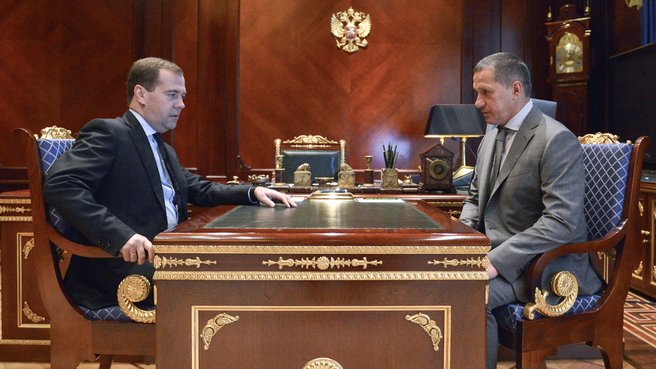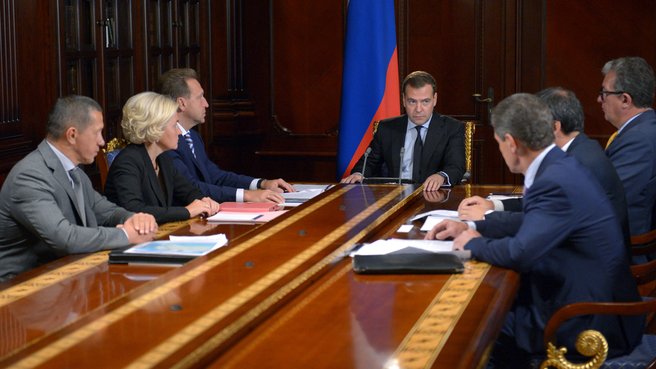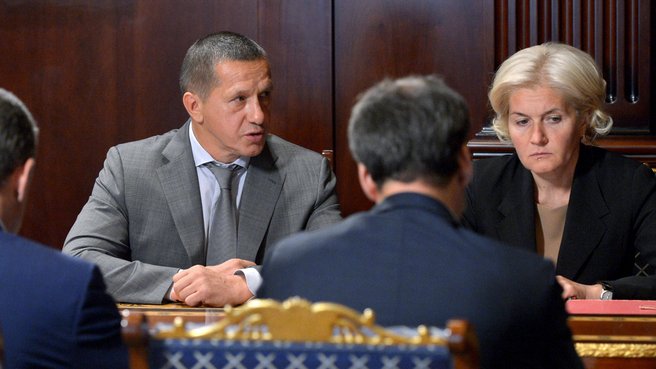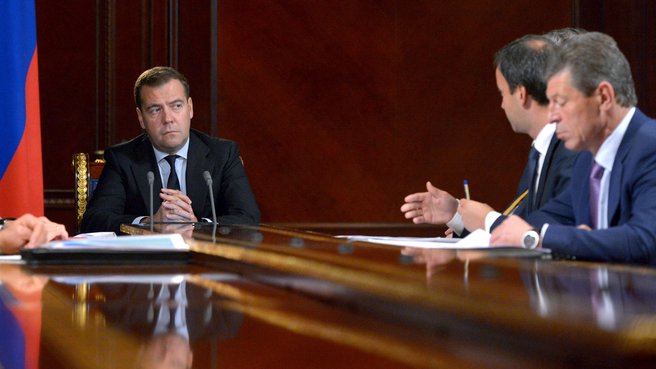The meeting focused on the relief operation in the flooded areas of the Far East and sustainable operation of electric power companies.
Before the meeting, Dmitry Medvedev met with Deputy Prime Minister Yury Trutnev, the Plenipotentiary Representative of the President in the Far Eastern Federal District.
Dmitry Medvedev’s opening remarks
Arkady Dvorkovich on the situation in the Far East
Arkady Dvorkovich’s report on the sustainable operation of electric power companies
Transcript:
Dmitry Medvedev: Let’s begin with the situation in the Far East. This is the first meeting to be attended by Yury Trutnev, who has been appointed Deputy Prime Minister and is the Plenipotentiary Representative of the President in the Far Eastern Federal District. I hope that this will enable us to redouble the Government’s efforts in the Far East. We wish Mr Trutnev success. For obvious reasons, he needs urgently to join our efforts to clear up the consequences of an unprecedented flood in the region.
Members of the Government, including ministers, First Deputy Prime Minister Igor Shuvalov and Yury Trutnev, who was appointed Deputy Prime Minister shortly before that, spent last week in the region. Following a number of meetings, an executive order was signed and the tasks were formulated for dealing with the consequences of the flood, including the establishment of a government flood relief commission, which is to be chaired by Yury Trutnev. Another government commission will oversee the sustainable operation of water utilities in Siberia and the Far East. This will be chaired by Arkady Dvorkovich. And lastly, using the experience of the Caucasus, which has a Government Commission on the Socio-Economic Development of the North Caucasus Federal District, we will establish a corresponding government commission on the development of the Far East, to be chaired by the Prime Minister, that is, me. The former two commissions will be established at a government meeting tomorrow. The relevant materials must be submitted for doing this.
Our priority goal is to restore normal life and to create normal living conditions for the people, to compensate their losses, in the specified amounts, of course. We must do everything possible to protect people in the risk zone and to adapt social facilities for this purpose. Of course, schools, hospitals, post offices and stores must resume operation and must work as normal.
Although the situation is still very complicated, as we have said, and the water level keeps rising in a number of regions, we must start planning the reconstruction of roads, bridges, power lines and the other infrastructure damaged by the flood. These are the main things we must do to stabilise the situation and to clear up the consequences of the flood.
Dmitry Medvedev: "Our priority goal is to restore normal life and to create normal living conditions for the people, to compensate their losses, in the specified amounts, of course. We must do everything possible to protect people in the risk zone and to adapt social facilities for this purpose."
As was said at a recent meeting, as well as in the Far East, we must help farmers, namely stipulate additional food deliveries from other regions and, of course, monitor prices.
The issue of fuel was discussed separately. We must prepare for the heating season with due regard for the disaster.
And lastly, we must continue to keep a close watch on the sanitary and epidemiological situation. This is not only Mr Trutnev’s duty, who will shoulder the bulk of current work and so will need to travel to the region, but also that of other members of the Government and the deputy prime ministers who are responsible for related spheres. I am asking you to take this into account and to monitor the situation as a matter of priority. Mr Trutnev, how are things looking in the region now, and what are your plans? Please proceed.
Yury Trutnev: Mr Medvedev, colleagues, a state of emergency is being maintained in three constituent entities of the Russian Federation: the Amur Region, the Jewish Autonomous Region and the Khabarovsk Territory. Floodwaters are still rising in the Khabarovsk Territory and the Komsomolsk-on-Amur area seems to be in the most danger. As of 9 am today, the water level is 805 centimetres up on the zero mark in Khabarovsk and 820 centimetres in Komsomolsk-on-Amur. Consequently, we have to evacuate 36,000 more people, or twice as many as have already been evacuated (15,500).
Yury Trutnev: "At present, 150 combined emergency relief crews are working in the state-of-emergency zone. In all, there are 45,000 personnel and over 7,000 pieces of equipment, including 11,000 crew-members from the Emergency Situations Ministry."
We have created the necessary conditions for the evacuation and are laying stocks of food and medicines in the needed amounts. At present, 150 combined emergency relief crews are working in the state-of-emergency zone. In all, there are 45,000 personnel and over 7,000 pieces of equipment, including 11,000 crew-members from the Emergency Situations Ministry.
The weather service, Roshydromet, forecasts that the floods will peak in the Khabarovsk area on September 6-9 with 820 to 830 cm water levels. In Komsomolsk-on-Amur, the peak is expected on September 11-15 with 930 to 980 cm water levels, which is the absolute highest ever recorded in history.
Dmitry Medvedev: Yes, it’s an absolute record high.
Yuri Trutnev: The necessary engineering work is being performed to protect the flooded areas, and an additional evacuation of residents is in progress. Hot meals are served at their temporary residences and they are provided medical and psychological assistance. Pursuant to the President’s executive order, the Government Flood Relief Commission has drafted a resolution, which is being considered by the Government. Some commission members and I are planning to leave for the disaster area tomorrow evening to coordinate the federal and local relief effort, including the provision of assistance to victims and infrastructure restoration. In parallel, aid is being extended to people affected by the floods. Igor Shuvalov and his staff will be working out financial solutions later today. As of today, the number of flood victims on our lists is 98,800.
Dmitry Medvedev: Thank you. The necessary orders will be released tomorrow. I would like to ask the government executive staff to closely follow the execution of each instruction in this regard. Mr Trutnev and his colleagues will leave to address the problem of floods on site as soon as the necessary decisions are approved. I hope that all members of the Government, both present here and not, will control the situation to the extent to which it concerns their respective agencies.
Mr Dvorkovich, do you know what your commission on water resources should do?
Arkady Dvorkovich: Yes. Our tentative analysis shows that there are two essential problems. First, we need a better system for observations and scientific forecasting, as well as an early warning system. As is only natural, the observation posts that our regulations provide for are in place, but their number is insufficient for full-scale forecasting at storage reservoirs, hydropower stations, and the main river basins. Second, we can regulate water resources by building new storage facilities and new hydropower plants. These are the two main things that my commission will handle. I am planning to leave for the Far East on September 10 or 11 to organise the commission’s work and to see what is happening on the ground.
Dmitry Medvedev: Good. You should focus on the areas that have sustained the most damage, since the situation is totally unprecedented. We’ve just seen a report on the expected water levels in Komsomolsk-on-Amur between September 9 and 15. Overall, the commission which is about to be established should evaluate the situation in order to understand how water resources of Siberia and Russia’s Far East should be regulated in general, not just with regard to what has happened. Unfortunately, such natural disasters may happen again, and not only there. In general, they occur quite regularly, only this time the flooding was simply unprecedented. You should work on these issues.
There is another issue within the scope of your authority. It relates to the sustainable operation of energy facilities. In late August, I signed a resolution amending certain government regulations. It has to do with competitive capacity outtake for 2014, including in Russia’s eastern regions, and regulations for trading energy, the so-called capacity trade, pricing principles and shifting to long-term parameters for capacity outtake. What will this mean for power generating companies? What is to be expected? What are the problems in this area? Go ahead.
Arkady Dvorkovich: Competitive capacity outtake scheduled for this year will be held within the next several days. Although this procedure has existed for several years, this time substantial changes have been introduced under a resolution dated August 27.
What are these changes about? First, they concern commissioning substantial volumes of new and upgraded facilities for a total of 15 gigawatts in the last few years, and another 25 are expected to be commissioned by 2016. This means that capacity shortages will no longer be an issue in any part of the country. Second, newly commissioned power grids cover considerable distances, which enables capacity transfers between regions and economic activity zones, and thus promotes competition. It potentially caps price increases and could even lead to lower prices for end consumers. Accordingly, the resolution sets forth that there will be two fewer free power transfer zones in 2014, and we intend to draft proposals to further reduce the number of such free power transfer zones. What that means is that there will be fewer transmission constraints, and we expect to limit price increases through such energy transfers.
The second change concerns Siberia, where the potential usable capacity of hydropower plants depends on water levels. This year, water levels are very high, so the deficit is naturally not on the agenda. Furthermore, high water levels and commissioning of new facilities are expected to lower prices in certain regions of Siberia, which would have a positive impact on a number of energy-intensive enterprises. However, this does not mean that we are insured against low-water periods. In this respect, the resolution increases reserve requirements for competitive capacity outtake in order to avoid capacity shortages during low-water years. This will pave the way for using the available capacity more efficiently and for limiting price increases.
Finally, it has been envisaged that capacity outtake should cover a period of three years. Nevertheless, the resolution sets forth that the capacity outtake will be carried out for only one year due to macroeconomic uncertainty and unpredictable energy consumption. We will have to sit down with the interested government and regional bodies in the near future to evaluate the situation and, possibly, scale down investment programmes in order to avoid inflicting an additional burden on consumers in this challenging economic environment.
Dmitry Medvedev: We will discuss the challenging economic environment and tariffs, as well as what is there to be done in the near future, right after this meeting, as was agreed earlier, with the heads of Russia’s infrastructure monopolies.
I hope that this resolution will improve the situation on the power capacity market and help control prices, which is really important. Thank you!
















